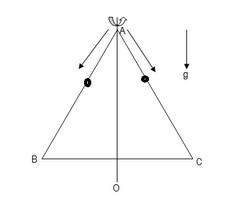Problem on rotation
 An
formed from a uniform wire has two small identical beads initially located at
. The triangle is set rotating about the vertical axis
. Then the beads are released from rest simultaneously and allowed to slide down, one along
and the other along
as shown. Neglecting frictional effects, the quantities that are conserved as the beads slide down are
An
formed from a uniform wire has two small identical beads initially located at
. The triangle is set rotating about the vertical axis
. Then the beads are released from rest simultaneously and allowed to slide down, one along
and the other along
as shown. Neglecting frictional effects, the quantities that are conserved as the beads slide down are
This section requires Javascript.
You are seeing this because something didn't load right. We suggest you, (a) try
refreshing the page, (b) enabling javascript if it is disabled on your browser and,
finally, (c)
loading the
non-javascript version of this page
. We're sorry about the hassle.
For making it higher level problem and more interesting & For Playing with physics for fun ... You can make changes in this question Like "Place this plank on ground andd then frame an Application based question on this situation Like as JEE does , asking time interval in which pariticles reaches to respective edges , or velocity of them , or something else .... "
In my views you should post this as a question ! I have answered to all these situation ... And In my views asking time interval will be more realistic situation..! You should try this .... and do post it as question , and I have answer to this question .. we can telly that ..! Also You asking time will be need good calculus ... you can check that at wolframalpha
For simplicity we can take data as Wo=1 rad/sec , a=1m (side) !